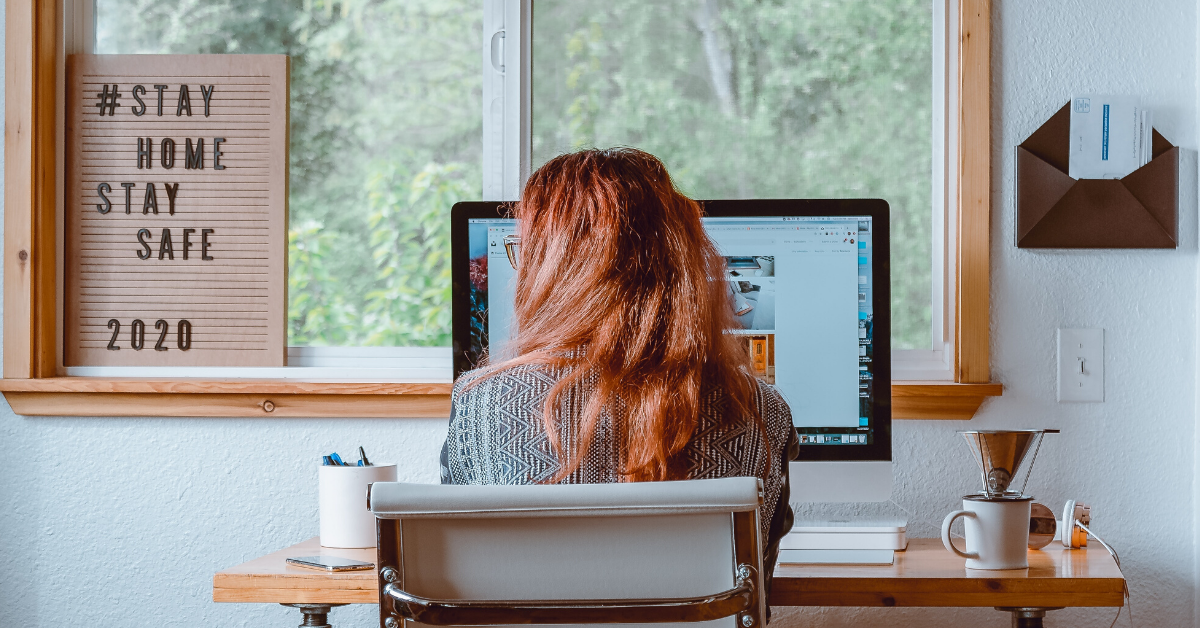Whether on a temporary or permanent basis, working from home presents unique challenges that can hinder your workflow.
Adapting your personal space to incorporate your work life can be difficult, but it is also a fantastic opportunity to learn about how you work at your best.
Outside of a traditional office environment, you will need to establish your own structure when working from home.
Your space, schedule and routine will play a major part in how productive you are but also in how well you’re able to disconnect from your work.
Here are some working from home tips to find a balance that will allow you to separate the personal from the professional, feel motivated to work and keep your energy levels high.
Set up your office space
The first step to boosting your productivity when working from home is to make sure you have a comfortable and practical office space.
This area should signal to your brain that you’re entering your workspace and get you in a productive mindset.
The office space you set up should work for you and your home, so adapt it to what you have!
It doesn’t need to be a separate room to be effective: your bedroom or living room can work perfectly, as long as you have a way of defining your work area.
You don’t have a commute and you’re not stepping into a different building, you’re home.
But that doesn’t mean you can’t create a distinct set up for your office that tells your body that it’s work time.

The main element is to ensure this space is practical, so setting it up doesn’t eat into your workday, and that it is comfortable.
Wherever you sit should help you maintain a good posture, and allow you to access any physical document or devices you may need.
This is your space, so use this opportunity to move it around and adapt it to your needs.
It should help you focus and avoid distractions, with the added bonus of being customisable. Having a dedicated office space and a routine will help you to adapt to remote work.
This is the time to work while listening to the music you like, at the volume you like; or to enjoy the silence you’ve always dreamed of.
This is arguably the most enjoyable of all working from home tips!
Set yourself a clear schedule
Once your space is set up, make sure not to spend your days sitting at your desk without looking at the clock.
Despite working from home, your work hours still apply.
In all likelihood, your day will start a little later as you’re not commuting – test if your alarm clock needs updating.
Don’t forget to make time for your breakfast!
To stay alert and as productive as you can be, don’t forget to take regular breaks during your day, whether a lunch break or a couple of minutes to clear your head and move around a little.
Either way, allow yourself to step away from your work in the same way you would if you were in an office.
Being home doesn’t mean you should be glued to your work all day, and this is why setting up a clear structure and schedule is vital.
The goal is to help you establish a daily rhythm.
Breaks let you regroup and refocus your thoughts, so you return from that pause with renewed motivation and efficiency.
This also goes for your evenings.
You wouldn’t spend your nights in the office, so make sure that your evenings are still yours.
Whether your hours are set by your employer or yourself, stick to that schedule and leave your office space or set up.
The clearer you are with these boundaries between professional and personal time, the easier it will be for you to stay focused and productive when you need to be.
Create a routine that works for you
Now that you have a workspace and a schedule, it’s time to determine what kind of day works best for you.
Working from home, you may feel more detached from your work.
Hopefully, establishing a workspace helps with this, but one of the most effective working from home tips is to change into work clothes.
No need to dress up too much, but ensuring you don’t work in your pyjamas is key in getting you into the right mindset.

You may find your levels of productivity vary along the day; use this to your advantage by scheduling your tasks based on how much energy they require.
If you feel most productive in the morning, reserve this time for the projects that demand the most stamina and keep the easier tasks for the dreaded post-lunch slump.
Depending on how much control you have over your schedule you may be able to plan your days in advance so you can start each morning with specific goals.
You can then optimise your day by avoiding spending high energy time on low energy tasks, or toiling away at a project when you’re at your least motivated.
As with the workspace set up, the main element here is that you find what works for your way of working, so this may involve some trial and error before finding the system that works best for you.
Bonus Tip: Short Exercise Breaks
Since work-from-home is more about sitting at your computer for longer hours with everything in reach, the likelihood of feeling pain in the lower back down to legs is higher. According to recent research, Lower Back Pain or Sciatica is considered the most costly disorder.
It can affect daily life and cause hindrance in completing daily tasks, resulting in the reduction of overall productivity.
That’s why it is suggested to take breaks between tasks and do some short exercises and stretchings. It will reduce the chances of Sciatica and help you stay productive and energetic at work.
Adapt your communication methods
When working from home, the distance from your team and colleagues can make you feel isolated.
Staying in contact with your team through messaging or video is important, but a vital tip for working from home effectively is to ensure that you’re using these tools in a positive way.
Attending multiple meetings and scheduling several appointments a day can seem like a chore but a lack of interaction with colleagues is also an issue.
As with in office meetings, a good way to ensure everyone’s time is used effectively is to clearly state the goal of the meeting, its agenda and what input will be required from attendees beforehand, so everyone is able to prepare accordingly.
Structured meetings are great to spread information, but they don’t emulate the kind of casual conversation you get from co-workers chatting in an shared office space.
Proposing less formal meetings with few attendees can be valuable to brainstorm or trouble shoot ideas that will increase the team’s productivity but also their morale, especially when transitioning from an office environment to working from home.
Stay active
Most working from home tips focus on being productive once you’re sitting at your desk.
But a major element of your productivity is how energised and motivated you feel, and this is where your physical activity comes into the picture.
Sitting down all day staring at a screen is a sure-fire way to tire your eyes – and brain.
The idea of moving around throughout the day doesn’t necessarily mean you should be running or going to the gym or practicing yoga everyday – although if you are, brilliant!
The main thing is to ensure you’re not hurting yourself by sitting uncomfortably for too long or typing at an awkward angle.
Standing up and stretching your neck and your limbs every hour or so is enough to make sure you’re feeling good to keep working. Taking walks is great too!

This will also ensure you look away from your screen regularly.
Finding time in your day to be away from screens may be tough, particularly when your job revolves around digital media and requires you to stay connected on one or multiple devices.
But the time you spend away from them will allow your eyes to rest and ensure you can come back more efficient than ever!
Remember to enjoy your down time
Working from home probably means you’re spending most of your time within a single space.
Fuel your creativity by surrounding yourself with things that inspire and motivate you.
Along with work, your day should include your hobbies and interests.
Anything that switches your mind off work is helpful to ensure you enjoy your down time and get back to work fully recharged.
At times when you’re feeling less motivated, use your hobbies as an incentive throughout the day: once you’re done with this project, you know you can look forward to reading a book, finishing a puzzle or starting a new video game.
Depending on your interests, this can also be a perfect time to socialise with friends, or maybe to find the alone time you need.
Either way, this is an important aspect to making sure that your home doesn’t become your office.
Just like setting clear schedules and a specific workspace, enjoying your time away from work will allow you to find balance between a productive day and an enjoyable evening.

Working from home is a fantastic opportunity to set your own structure and work in an environment personalized to fit your needs.
Optimising your workflow may require some trial and error, but observing and learning how you work best is invaluable.
These working from home tips should give you the opportunity to structure and balance your days so you feel motivated and productive, while maintaining healthy boundaries between your work and your personal life.




